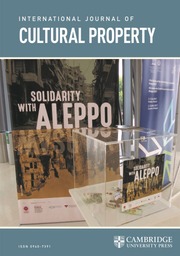No CrossRef data available.
Article contents
Introduction
Published online by Cambridge University Press: 17 September 2010
Extract
World War II was the occasion of the greatest theft, seizure, loss, and displacement of art treasures, books, and archives (“cultural items”) in history. Since then, governments and others have attempted to justify either their right to keep or to claim the return of the cultural items displaced as a result of the war and its aftermath. Such issues have intensified on the Eastern Front since the collapse of he Soviet Union and the opening of the Soviet secret depositories of long-hidden cultural items brought to Soviet territories at the end of the war. The principal protagonists in the public arena have been the Federal Republic of Germany (Germany), the Republic of Poland, and the Republic of Hungary, each claiming that the Russian Federation (Russia) has refused to negotiate adequately the return of cultural items displaced during and after the war that are now located in its territory.
- Type
- Introduction
- Information
- Copyright
- Copyright © International Cultural Property Society 2010


